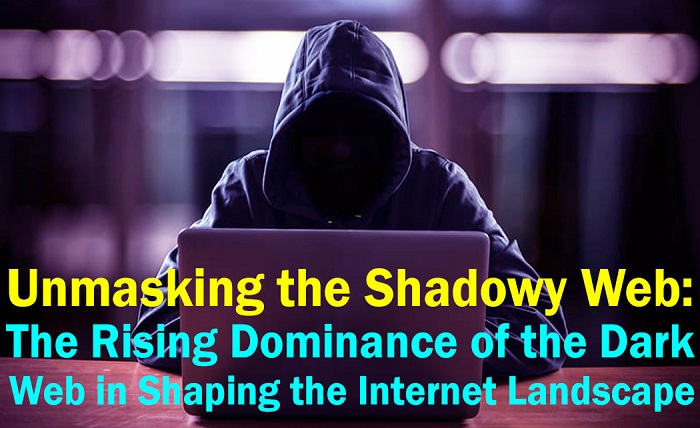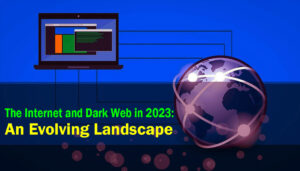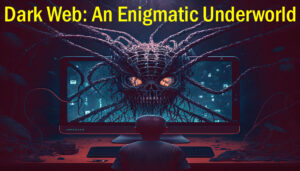The Increasing Influence of the Dark Web on the Internet

The dark web, with its encrypted networks and hidden services, has been steadily gaining influence and control over the internet. This section explores the ways in which the dark web is exerting its presence and impacting various aspects of the internet landscape.
Illicit Marketplaces and Cybercrime:
One of the primary ways in which the dark web is taking control of the internet is through the proliferation of illicit marketplaces and cybercrime activities. These underground marketplaces facilitate the sale of illegal goods and services, including drugs, stolen data, hacking tools, and more. The anonymous nature of the dark web enables criminals to operate with a degree of impunity, posing challenges for law enforcement agencies worldwide.
Cyberattacks and Data Breaches:
The dark web serves as a breeding ground for cyber criminals who launch sophisticated attacks and carry out data breaches. These attacks target individuals, businesses, and even government organizations. Stolen data, such as personal information, financial records, and login credentials, are often sold or traded on the dark web. The impact of these cyberattacks can be widespread, leading to financial losses, reputational damage, and compromised privacy for individuals and entities.
Anonymity and Privacy Concerns:
The dark web’s emphasis on anonymity and privacy has sparked concerns regarding the erosion of online privacy and the potential for illicit activities. While privacy is a fundamental right, the dark web’s unregulated nature makes it an attractive haven for illegal activities, including terrorism, human trafficking, and illegal pornography. This ongoing battle between privacy rights and the need for public safety and security poses challenges for governments and internet governance bodies.
Underground Information Sharing:
The dark web has become a platform for underground information sharing, where whistleblowers, activists, and journalists can exchange sensitive information without fear of surveillance or censorship. While this aspect can be seen as a positive force in promoting transparency and accountability, it also creates challenges in distinguishing between legitimate activities and malicious intent.

Threats to Cybersecurity:
The dark web’s growth and influence pose significant threats to cybersecurity. It provides a marketplace for the sale of hacking tools, malware, and exploit kits, empowering cyber criminals with the resources to launch sophisticated attacks. This constant exchange of malicious tools and techniques raises the bar for cybersecurity professionals who must stay vigilant and adapt their defense strategies to mitigate evolving threats.
The dark web’s increasing control over the internet raises complex challenges for individuals, businesses, governments, and the overall security of the digital landscape. While the dark web offers certain advantages, such as privacy and anonymous communication, it also fuels cybercrime, illicit activities, and threats to cybersecurity. Striking a balance between privacy rights, cybersecurity measures, and effective law enforcement is crucial in navigating the evolving landscape of the internet and mitigating the negative impacts associated with the dark web’s control.
The Internet and Dark Web in 2023: An Evolving Landscape
As we delve into 2023, the internet and the dark web continue to evolve, shaping the digital landscape in unique ways. This section explores the current state of the internet and the dark web, highlighting key trends and developments that have emerged in recent times.
Internet Accessibility and Connectivity:
Internet accessibility has become more pervasive than ever before. With advancements in technology and infrastructure, more regions around the world are gaining access to the Internet. The proliferation of mobile devices and the growth of internet service providers have contributed to increased connectivity, bridging the digital divide and bringing people online.
Rise of Streaming Platforms and Content Consumption:
Streaming platforms have witnessed a tremendous surge in popularity, revolutionizing the way we consume digital content. Platforms such as Netflix, Amazon Prime Video, and Disney+ have reshaped the entertainment industry, offering on-demand access to a vast library of movies, TV shows, and original content. This shift in consumer behavior has disrupted traditional media channels and reshaped the way content is created, distributed, and monetized.

Social Media and Online Communities:
Social media platforms continue to dominate the internet landscape, connecting individuals and fostering online communities. Platforms like Facebook, Instagram, Twitter, and TikTok have transformed how we communicate, share information, and engage with others. These platforms have become powerful tools for personal expression, social activism, and brand promotion, but also face challenges related to privacy, misinformation, and content moderation.
E-commerce and Digital Marketplaces:
The Internet has become an integral part of the global economy, with e-commerce and digital marketplaces experiencing significant growth. Platforms like Amazon, eBay, and Alibaba have revolutionized the way we shop, providing a convenient and vast marketplace for consumers and businesses alike. The COVID-19 pandemic further accelerated the shift towards online shopping, highlighting the importance of robust e-commerce infrastructure.
Dark Web: An Enigmatic Underworld:
Parallel to the surface internet, the dark web continues to operate as an enigmatic and secretive realm. It harbors anonymous communication networks and hidden services that are shielded from traditional search engines. While the dark web has legitimate uses, such as anonymous whistleblowing and censorship resistance, it also hosts illicit activities, including illegal marketplaces, cybercrime, and hacking forums.
Privacy and Security Concerns:
As the internet becomes increasingly integrated into our lives, concerns around privacy and security have become more pronounced. Data breaches, identity theft, and surveillance pose significant risks to individuals and businesses. With growing awareness, users are demanding stronger privacy protections, and regulations like the General Data Protection Regulation (GDPR) and California Consumer Privacy Act (CCPA) have been introduced to safeguard user data.

Conclusion:
The internet and the dark web are dynamic and ever-evolving entities that shape our digital experiences in different ways. While the surface internet has brought connectivity, convenience, and opportunities, the dark web presents both challenges and opportunities, requiring a delicate balance between privacy, security, and the need to combat illicit activities. As we navigate the digital landscape in 2023 and beyond, it is crucial to leverage the benefits of the internet while being mindful of the risks and complexities it entails.




